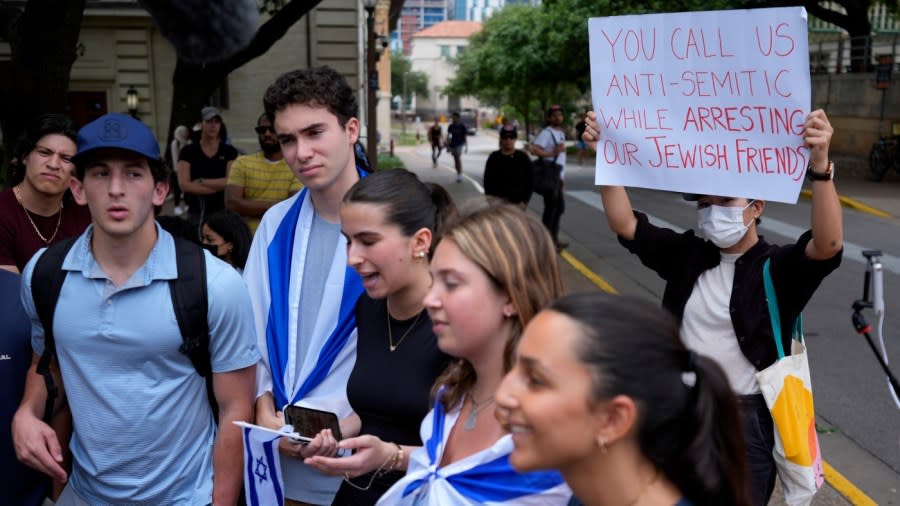Jewish and Muslim college students will be glad to leave this academic year behind

Jewish and Muslim students at U.S. colleges are exhausted as their academic year comes to a close.
Antisemitism and Islamophobia have both spiked on campuses in the wake of the Oct. 7 Hamas attack on Israel, and the recent anti-war encampments have greatly disrupted student life.
“This year has definitely impacted me academically a lot,” said Shani Glassberg, an Israeli American and junior at George Washington (GW) University, adding she had to postpone finals due to the unrest on her campus.
In April, the Anti-Defamation League (ADL) released findings that antisemitic incidents on campus in 2023 tripled from 2022, up about 321 percent. The study did not include antisemitic incidents from the first half of 2024.
While Glassberg said she received tons of support from her classmates in the first week after the Oct. 7 attack, which killed about 1,200 people, “it turned into a very, very hateful situation” quickly. She said she saw “some people find ways very quickly to justify” the Hamas attack and that “really hurt me on a personal level, academic level.”
Adena Kirstein, executive director of GW Hillel, said she has worked with hundreds of students who are finding themselves drained at the end of this semester.
“They would be weary if they were just finishing up their academic years, but they’ve been carrying a lot of strain on their shoulders just in terms of what’s been going on campus,” Kirstein said.
The stress ramped up considerably last month with the arrival of pro-Palestinian encampments on campuses across the nation, and GW was one of several schools that made headlines over its demonstration after District of Columbia police initially refused the administration’s request to clear the protest. The encampment eventually got removed Wednesday morning, hours before Washington’s mayor and the head of the city’s police were set to testify in front of Congress over the issue.
Police used pepper spray on the demonstrators, and 33 people were arrested.
“There was lots of strong graffiti around the encampment with different antisemitic stereotypes,” Glassberg said.
Hafiza Khalique, a first-year Muslim student at New York University (NYU), told The Hill she was the first person she knew of who was suspended in the pro-Palestinian movement back in October.
NYU suspended her through the end of the academic year for tearing down posters on campus about Israeli hostages. She is currently suing her school over the suspension.
“There is a concerning amount of Islamophobia on campus. For years, NYU has had many claims of anti-Arab and anti-Muslim hate. This year it has reached an unprecedented level,” Khalique said.
The Council on American-Islamic Relations (CAIR) released its national civil rights report in April showing that in 2023 it received the highest number of anti-Muslim complaints in 28 years, with more than 8,000 recorded incidents across the country.
Reana Akthar, a Muslim student at Wesleyan University, told The Hill that once, as she was wearing a keffiyeh, a traditional Middle Eastern headdress, someone on campus told her to go back to her country.
“It feels like I’ve been walking in a dream these past couple months because there are people firm in their belief that Palestinians have what’s coming to them, and I think that’s unacceptable,” Akthar said when talking about the culture on her campus.
Thousands of people have been arrested at the pro-Palestinian encampments, but Wesleyan still has its up, and students say they won’t leave until their demands such as the school’s divestment from Israel are met.
“It is a ridiculous time to be a student. It’s hard to complete work. It’s hard to go on and pretend that everything is normal … at the same time there are people my age being slaughtered” in Gaza, Akthar said.
“Muslim students, I think there’s many competing feelings. On the one hand, there is a lot of disillusionment and frustration with our administrations and, of course, exhaustion for feeling like they are having their First Amendment rights violated, feeling like their free speech is being killed, feeling like they are being scrutinized in a way that’s very damaging, compared to other student populations,” said Dina Chehata, CAIR’s civil rights managing attorney.
“And I think there’s also different sentiment from a lot of Muslim students I’ve spoken to that have been very active in the in the ‘free Palestine’ movement, calling for Palestinian liberation and divestment from weapons manufacturers. I think there’s a sense of community that’s very powerful,” Chehata added.
For the latest news, weather, sports, and streaming video, head to The Hill.

